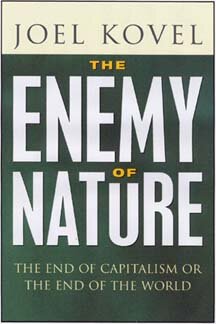 |
OVERCOMING ZIONISM'This book is absolutely fundamental for those who reject the unfortunate confusion between Jews, Judaism, Zionism and the State of Israel -- a confusion which is the basis for systematic manipulation by the imperialist power system. It convincingly argues in favour of a single secular state for Israelis and Palestinians as the only democratic solution for the region.' Samir Amin, Director of the Third World ForumTo purchase, Visit Pluto Press |
 |
"A must read for thinkers and activists" -Walden BelloAvailable now$20 plus shipping and handling. We accept Visa, Mastercard, American Express, check or money order. Please call toll-free (888) 874-6904. |
New from Glad Day Books: HISTORY AND SPIRIT by Joel KovelAvailable for $21.95 plus shipping and handlingTo order, call toll-free (888) 874-6904. |
||
 |
Glad Day Books is proud to announce its release of the second edition of Joel Kovel's HISTORY AND SPIRIT. Originally a psychiatrist and psychoanalyst, and presently professor at Bard College, public intellectual and political activist (having just run for the US Senate for the Green Party in New York), Kovel has published eight books on topics that have included racism, psychoanalysis in society, nuclear terror, Sandinista Nicaragua and anticommunism. First published in 1991, HISTORY AND SPIRIT is his credo, and a radical challenge to the sterility of both contemporary materialism and spirituality. |
|

A Preview of "The Enemy of Nature"Thesis: That the current world capitalist system is unsustainable and unreformable. The implications are explored to the fullest extent, posing the alternative of ecological catastrophe or building a world beyond capital and its empire. This latter path is concretely imagined as an "ìecosocialist" revolution, which shares with "ìfirst-epoch" socialism the goal of emancipating labor from capital, while transforming this in the realization of an ecological production grounded in the ascension of quality over quantity. Chapter Synopsis Preface, Chapter 1. Introduction PART ONE: THE CULPRIT Chapter 2. The Ecological Crisis. Introduction to the notion of a crisis of global proportions affecting all ecosystems, natural and human, in a cascading, non-linear pattern. The question of causality. Chapter 3. Capital. Analysis of the Bhopal disaster. Capital as a great ëforce fieldí and the ëefficient causeí of the crisis. Structural features of capital mandating this: the ëSecond Contradiction,í degrading the conditions of production, combined with the fatal pressure to expand. Chapter 4. Capitalism. The society that realizes and embodies capital. Modes of expansion: penetration of life-worlds; alterations of space and time; imperialism and globalization. Character of the ruling class and its inability to adapt. Criminal underside. The indictment. PART TWO: THE DOMINATION OF NATURE Chapter 5. On Ecologies. The fourfold character of ecology. The nature of life, its formativity and relation to the laws of thermodynamics. Human nature as the transforming of nature. Ecosystem integrity and disintegration. Chapter 6. Capital and the Domination of Nature. Capital as the current manifestation of an ancient lesion. The core of this in gender domination. The gendered bifurcation of nature. Class, money and the rise of capital. Philosophical interlude: Heidegger and dialectics. Capitalís unreformability. PART THREE: TOWARD ECOSOCIALISM Chapter 7. Critique of Actually Existing Ecopolitics. A survey of the adequacy of existing political strategies with respect to the necessity of overcoming capital: Working within the system; voluntarism; technological solutions; various strands of green, community-based, or other ecologically based yet non-socialist economics; Eco-philosophies such as deep ecology, bioregionalism, ecofeminism, social ecology; democracy, populism; the spectre of ecofascism. Chapter 8. Prefiguration. The Bruderhof as an intentional anticapitalist community; use and exchange value in relation to each other; critique of first-epoch socialism; the ecological status of Marx; ecological production as the building of ecosystem integrity through the holding together of dynamic elements; its relation to a transformation of gender; prefigurative, interstitial character of transformative ecopolitics. Chapter 9. Ecosocialism. The course of revolution. Building ecological ensembles. The emergence of an ecosocialist party on a world scale. Specifics of revolutionary transformation. Ecosocialism as a ìusufructuaryî of the earth. The transition to ecosocialism: markets, money; post-revolutionary violence and the state; pleasure; internationalization; the World Peopleís Trade Organization; guidelines for present activists. Afterword. Grounds for good cheer . ADVANCE PRAISE FOR THE ENEMY OF NATURE"Full of insights into the relationship between ecological degradation and capitalist expansion, this is a must read for thinkers and activists." Walden Bello, Executive Director, Focus on the Global South, Thailand
THE ENEMY OF NATURE London: Zed, Winter 2002 'The Enemy of Nature' is a challenging book, written with passion and eloquence. Its forcefully stressed core message is that 'capital cannot be reformed: it either rules and destroys us, or is destroyed, so that we may have a lease on life'. The underlying causes and their far-reaching implications are systematically explored, rich in detail and insights, leading to much needed radical conclusions. The book should be read by all those who are concerned about the survival of the human species. Istvan Meszaros, author of "Marx's Theory of Alienation" and "Beyond Capital" "Joel Kovel's book the Enemy of Nature: The End of Capitalism or the End of the World? is a necessary and timely book. Necessary because it openly declares capitalism as THE destroyer of the earth and all eco- systems. Timely, because it appears at a time when more and more people begin to lose faith in capital's ability to solve the social and ecological crises. The book is a must for all those who are active in the international movement against corporate driven globalisation and who look for a perspective beyond capital's enslavement of nature and people." Maria Mies, author of "Patriarchy and Accumulation on a World Scale" "The Enemy of Nature exposes better than any other single work the extent and depth of capitalism's global ecological destruction. This master work by Joel Kovel then pursues the necessary implications -- including the opportunity and need to imagine an ecological socialist society. Kovel shows that the core conditions of such a society are the accession of quality over quantity and use-value over exchange-value, with the emanciaptory possibilities these imply.:" James O'Connor, author of "Natural Conditions" |
|
THE ENEMY OF NATURE, to be published early 2002, by Zed Books, London, US
Growing numbers of people are beginning to realize that capitalism is the uncontrollable force driving our ecologcal crisis, only to become frozen in their tracks by the awesome implications of the insight. Considering that the very possibility of a future revolves about this notion, I decided to take it up in a comprehensive way, to see whether it is true, and if so, how it came about, and most importantly, what we can do about it. |
|
Bush's Energy Crisis, Nature and Capital Accumulation: The Fossils Seize Power by Joel Kovel THE ENERGY SCHEMES of the Bush administration have been greeted with derision by the liberal punditocracy and the more responsible industrial states. Well they might: The plans are a horror, and precisely what one would expect from the "oiligarchy" that presently occupies the White House. With the President-in-name a scion of Texas oil interests; with the President-in-fact, Cheney, CEO of the company that rebuilt the Kuwait oil fields after he helped see to it as Secretary of Defense during the Gulf War that said fields would be bombed back to the Stone Age; and with the National Security Advisor, Condoleezza Rice, having had an oil tanker named after her upon accession to office, it would take a very dull eye to miss the special attention given to fossil fuels by the current regime. What goes for gasoline goes for electric power, much of which is produced by burning fossil fuels. Thus the panicky attention paid to the California energy crisis, now revealed to have been largely manufactured, including through the strategic shutdown of generators for purposes of "maintenance," with one worker telling the California State Senate that his plant was ordered by management to go up and down "like a yo-yo." Texas oil magnates were deeply involved in this contrived plunder of California's budget surplus. For example, Enron's CEO Kenneth Lay, who contributed half a million dollars to Dubya's campaign, was relied upon by Cheney to formulate energy policy and choose federal regulators. As Jim Hightower has commented, the Bush administration has advanced the process of governance by "eliminating the middleman." The officials on the take are no longer hirelings of businessmen, but the businessmen themselves. Unsurprisingly, Cheney's "Report on the Crisis" was a palpable fraud. "America in the year 2001 faces the most serious energy shortage since the oil embargoes of the 1970s," it began, then went on to point out that Americans today spend less than five percent of disposable income on energy costs, as against eight percent early in the Reagan years, scarcely evidence for crisis conditions in the sphere of energy. Though some of its prescriptions will undoubtedly be filled, the chief thesis of the report is going into the dustbin of history, to join other spectacles of presidential flimflam like Gerald Ford's campaign to Whip Inflation Now. At the time of this writing in midsummer, gasoline prices are headed downward rather than rising sharply as predicted, while California, thanks to conservation and some judicious governmental intervention, far from suffering catastrophic blackouts is actually exporting electricity to its neighbors. Experts and insiders from Alan Greenspan to the heads of oil companies, dismiss talk of an energy crisis as illusory. They Know the Drill All Bush/Cheney cares about, it has been made quite clear, is the maximum augmentation of energy supplies, whether derived from fossil fuels or nuclear power. By trying to create widespread panic about the wells of energy running dry and simultaneously pooh-poohing conservation strategies, the Republicans hoped to blow away opposition to opening up new sources of petroleum such as the Alaska National Wildlife Refuge. Meanwhile, the aura of desperation would weaken opposition to the comatose nuclear power industry. Finally, letting prices rise in an atmosphere of crisis would help make economical once more the flagging extraction of oil from working wells. It is in this context that Bush's radical hostility to the Kyoto Protocols for lowering greenhouse gas emissions should be seen, since whatever else Kyoto portends, it runs directly counter to the oiligarchy's drive to increase production at all costs. The line of reasoning employed by the administration is less than cunning. It relies on the principle of Blitzkrieg: break down the opponent's defenses through all-out pressure, and drive one's forces through the gap, establishing new conditions on the ground before resistance can mount. However, the preponderant material advantage necessary to secure these goals is not there. The fact remains that Bush is in office thanks to a coup and the miserable opposition of the Democratic Party, and that he operates with less legitimacy than any president in memory. With the defection of Jeffords and the resulting loss of the Senate, Bush's posturing on energy assumes a Reaganesque mandate, but fools too few people and alienates too many others. This energy crisis was faked in order to further enrich Bush's buddies; that much is certain. However, there is quite a bit more to the story. The administration may be laughably transparent in the service of rank greed; but there are virtues to transparency, which at the least offers a clearer view of reality and some honest lessons of what needs to be done. Clinton's Gory Record By contrast, the liberals who fulminate about Bush and energy confuse his excesses with the core of the problem, and wallow in nostalgia for Gore/Clintonian sanity about the environment, when no responsible official would contemplate opening up a great Wildlife Refuge to oil drilling. Well, no, Al Gore never threatened to drill in the Alaska National Wildlife Refuge. But he did open up the 2000 miles of Alaska coastline of the Arctic National Petroleum Reserve, as well as parts of the California coastline. And he sold off the Elk Hills Petroleum reserve to Occidental Oil, benefactor of his family, in the largest privatization in American history. Furthermore Clinton/Gore, despite 1992 campaign promises to raise fuel efficiency standards to 40 mpg, actually allowed these to decline to a greater degree than any other recent administration; and Gore joined George W. Bush in pushing for the "Clean Coal" subsidy, a crackpot scheme to sequester carbon dioxide (CO2) from burning coal in sea beds or mine shafts. Finally, Gore worked to have nuclear power granted a "renewable energy" exemption under the Kyoto treaty for which he takes so much credit, and has to be seen along with his successor, therefore, as playing a role in the remarkable comeback of that deadly industry. No doubt, Bush goes much further than Gore. Not simply dependent upon the energy industries, President Bush is an active part of them, either directly or through his closest friends, for example, old-school pal Thomas Kuhn, a major figure in the nuclear power industry and director of the Edison Electrical Institute, which represents companies that generate eighty percent of the nation's power. Bush is a more extreme, and therefore more transparent, version of government of, by and for big business. This is surely no cause for celebration, however much having one's enemy in plain view is preferable to having him hide behind a cloud of environmental fakery. Ecology vs. Accumulation The differences between Bush and Gore are real enough, but their fundamental identity as bourgeois politicians lays out a larger lesson which becomes obscured by the liberals' focus on the misdeeds of individual corporations. Once we begin looking at the class of capitalists as a whole, we are led also to take into account the movement of the great sea of capital which they produce and serve. From this standpoint, an energy crisis is not so much a question of physical shortages (the specter of which is real enough though still down the road), nor of individual greedy manipulations (also quite real, though scarcely a novel or systemic factor), but rather of the accumulation crises that drive capitalist society. The first sign, for example, that Bush was going to renege on his tepid campaign promises to care for the environment came in March, when he abruptly declared that his administration would no longer press for the limitation of CO2 emissions by electric power plants. This was followed a week or so later by the shocking announcement that the United States was pulling out of the Kyoto Protocols. But there was another shock that immediately preceded Bush's first announcement and which few took into account, namely, a precipitous several-hundred point fall in the stock market. We don't need the White House transcripts to infer the alarm bells this must have set off, in the context of a year-long stagnation in the once buoyant markets, and with an incipient recession looming‹alarm bells that soon began tolling for the prospect of cutting greenhouse gases. Capital cannot tolerate barriers, and bourgeois politicians see it as their highest duty to keep the wheels of accumulation turning. In this respect, a Cheney can speak much more freely than his liberal critics. His public statements are frankly of the need for continual growth, and of the reality‹plain enough to anyone who will take a good look‹that energy, derived from fossil fuels, is in fact the necessary foundation of the industrial-capitalist system. Bush/Cheney may be oiligarchs, but they also superintend what Marx called the common affairs of the entire bourgeoisie, and if they happen to be personally hooked into and enriched by the most fundamental natural ground of accumulation, so much the better for them as individual capitalists, no matter how much the worse for everyone else. The central point about accumulation is that production must be first of all of capital, and only secondarily, of the commodities in which capital is embedded. As capital must unceasingly grow else fall into crisis and even die, so must the logic of endless material growth be continually imposed upon society. In his report, Cheney observed that while in the year 2000, the United States consumed some 19.5 million barrels of oil per day (bpd), this figure was projected to rise to 25.8 million bpd by 2020. In all, this country with four percent of world population consumes about one-quarter of global energy supplies. This gross disproportion is widely observed and condemned; less taken into account, however, is the sensitivity to scale it casts over the U.S. national economy. The latter cannot simply undergo the sensible alternatives of conservation and efficient production, however sensible these might be from the perspective of the smaller or weaker economies, without risking serious jolts in capital accumulation. Capital's infamous addiction to short-term profitability is doubly exposed in the sphere of energy, from the standpoint of actual investments in fossil-fuel production, and from the utter dependence of the economy as a whole upon fossil fuel-derived energy. The dilemma is acute: What makes sense ecologically becomes a mortal threat to capital accumulation, and the threat increases as the scale of the economy increases. Thus the United States is a slave to its very magnitude. Needless to say, the dependence is turned on its head and outwardly expressed as domination. The sensitivity to scale of the world's super-economy dictates that this economy be endowed as a military and imperial superpower. Cheney observed that no matter how much more energy his initiatives might squeeze out of domestic production, this would do no better than remain flat at roughly nine million bpd by 2020‹in other words, U.S. domestic energy production has to run faster just to stand still. Meanwhile growth places more and more demand on supplies, the remainder of which need to be supplied from abroad, with a projected increase of 61% in foreign energy by 2020 calculable from the above figures. As Michael Klare has recently pointed out, this is a formula for heightened intervention. Indeed, the Cheney report speaks of pressuring foreign governments to open their energy sectors to U.S. firms, and of the need to ensure "stability" so that investment will be safe. It goes on to speak the watchwords of imperialism: "National security" is at stake in the "energy crisis." The treaty-busting shenanigans of the Bush administration and its increasing belligerence and unilateralism are most certainly part of this package‹as are, of course, the seismic shocks now felt throughout the world as a result. Confronting the Real Crisis Instead of whining about how terrible the Republicans are and longing to restore Clinton/Gore's sensible management of capitalism, we should draw the proper conclusions about the real problem of energy and act accordingly. There may be no immediate energy crisis in the sense drawn by Cheney's report. But this year's flap needs to be subsumed into a much more profound crisis generated by the constant and growing pressure placed by capital accumulation on nature. The so-called energy crisis, then, is a function of capital's chronic accumulation crisis, but also of the growing ecological crisis that puts the future of the human species itself into doubt. This can only be met by a radical transformation of society, within which a radically new approach to energy must be a necessary feature. Certainly, the various modalities of conservation and renewable energy will play a basic role in this future and must be supported in the present. But we should not become fixated on technological solutions in the sphere of energy. Put bluntly, capitalist industrial society cannot solve its problems through alternative sources of energy alone. A fundamental transformation of the system itself is required. There is no way, for instance, that solar, wind or hydroelectric energy can replace fossil fuels in the given industrial apparatus, however much they may improve it here and there. Solar energy is too diffuse, and its collection too expensive within current economic terms, to allow for more than a minor palliation of our energy difficulties by this means. Capitalism was built on concentrated energy, has consisted of the squandering of hundreds of millions of years of past solar power (concentrated in now-destroyed forests and rapidly depleting fossil fuel deposits) and now faces the reckoning. This fact of the 21st century cannot be evaded by so-called miracles like fuel cells which cleanly convert hydrogen and oxygen to water, the propaganda for which somehow always fails to point out that hydrogen, while the most abundant element in the universe, is not exactly at hand, and has itself to be produced in a usable form, mainly from methane (which itself has to be produced) and by employing large amounts of electricity. If we think there is a problem with electric power now, consider its scale when and if fuel cells come to replace the direct burning of fossil fuels in internal combustion engines. Any society capable of surviving the ecological crisis‹the energy manifestations along with all its other myriad forms‹must overcome the ceaseless addiction to growth-for-the-sake-of-growth that marks capitalism. In other words, it must be socialist, although a socialism capable of recognizing the limits to growth and the dilemmas of industrialization. Theorizing, let alone achieving such a society is a huge task, which should occupy us all in the period ahead. But however we figure this out, a prime goal for the present‹at least as important as the promotion of conservation and alternative energy‹has to be to break down capitalist ownership and control over energy. Concretely, radicals have a clear political line to follow in the increasingly vociferous struggles over energy. Let the liberals and Democrats call for new forms of regulation and the restructuring of energy markets. Our job is to consistently press for the socialization of energy, replacing private with public power, directly controlled by communities. This is a splendid opportunity, driven by a growing outrage against the energy gougers, an outrage whose populist sources can readily be given a socialist content‹all the more so in that there is a robust history of public power in this country which can be drawn upon for inspiration. In the process, it doesn't hurt to have so awful a bunch in Washington for purposes of instruction in the ways of capitalism.
|